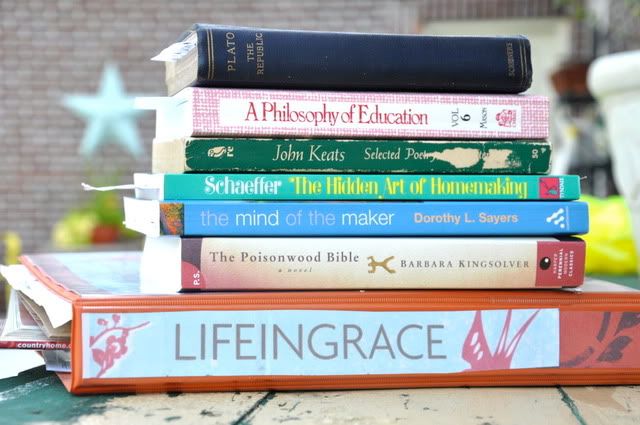I shall attempt to give my thoughts on C.S. Lewis’ book Till We Have Faces. I know this for sure; what little I can string together on the subject will be inadequate. This book left me stunned, ashamed and yet profoundly hopeful and longing. It’s a complex layered story that lays bare the human soul , exposing the depravity in us all and reminding us that our despair has been answered in the love and atonement of Another. Lewis forces the reader to lay down his weapons. To surrender the defenses with which we so violently protect ourselves. And he forces us, unarmed, bare, and vulnerable to look into the ‘mirror’ and face the hideousness that we see there. He reminds us that we can’t properly see till we have eyes, nor love till we have hearts; and we certainly cannot see His face, till we have faces.
Most of all, he leaves the reader longing—–for home.
This book is profoundly different from his other works, was claimed to be his favorite of his own books and was his last and—- in the opinion of many, including me—his best published work. He retells the story of the greek myth of Cupid and Psyche but from the perspective of Orual, who is Psyche’s older, hideous-looking sister. The book is, in essence, Orual’s complaint to the gods, about her life and the sometimes unfortunate, horrible situations in which she was placed. Lewis tells the story in the first person and describes Orual’s journey of self-discovery and how, though she is often abused and oppressed, finds time and time again that she is the oppressor herself. Though she was like a mother to her sister Psyche and loved her intensely, she learns that her love was laced with selfishness and self-preservation.
Orual later becomes a wise and beloved queen and is praised for her many skills. She wears a veil to conceal her ugliness and after many years, the people began to spread rumors, that perhaps she wears a veil because she’s too beautiful to show her face. She, however, knows the truth and is shown by the ‘gods’ that despite her outward appearance of success, she is destitute.
She says,
“I would set out boldly each morning to be just and calm and wise in all my thoughts and acts, but before they had finished dressing me I would find that I was back in some old rage, resentment, gnawing fantasy, or sullen bitterness. I could not hold out half an hour . . . I could mend my soul no more than my face.”
{sounds so oddly and clearly familiar to my every morning}
Orual’s journey of self-discovery comes full circle when she finally comes face to face with the gods. As she makes her complaint, she realizes the absurdity of her words, the uselessness of all the cover-ups and disguises. {It occurred me how often I’ve played a litany in my head of excuses and justifications and complaints to God and how childish it all must have sounded}
Orual says,
” When the time comes to you at which you will be forced at last to utter the speech which has lain at the center of your soul for years, which you have, all that time, idiot-like, been saying over and over, you’ll not talk about the joy of words. I saw well why the gods do not speak to us openly, nor let us answer. Till that word can be dug out of us, why should they hear the babble that we think we mean? How can they meet us face to face till we have faces?”
After making her complaint to the gods and realizing the wretchedness of her own soul, she must now face the gods’ complaint against her and she must do it un-veiled. And miraculously, in a most wondrous picture of Christ’s vicarious atonement for us, she is revealed as beautiful—-she is given the beauty of Psyche and when the gods judge her, they see only Psyche.
This book will not leave you pointing fingers to how others have been at fault for what’s wrong in your life. Or even how God has deserted you. It will boldly set a mirror in front of you and bid you see clearly. And it will give you hope, that when we are clothed with Christ, God, our judge, sees only Him and his perfect life and love and obedience on our behalf. His beauty overtakes our sin. We exchange our hideousness for His love and perfection, as a beautiful and gracious free gift. Lewis leads us to despair of ourselves and to ultimately find our true joy and hope in Another.
Lewis is brilliant in his ability to strip down the readers’ defenses, forcing us to look at ourselves for who and what we really are. And we are nothing, if not, desperate…….for home.
Note: This book is deep and rich and must be read and re-read. It will sucker punch you and leave you almost out of breath at times. I’ve read certain sections more than ten times and am still reeling from the truths that can be found here. But beware, this book will get under your skin and gnaw at all your presuppositions.
{After reading the book, there was something at its’ essence that reminded me of Matthew Mayfield’s song Open Road. I’ve included the lyrics and installed the song at the top of this post–just above the date. Just push play and let your defenses wash away}
Open Road
Lay me down on
shores of the whitest sand
soft like that woman
with the fight of a thousand men
and if you find the key
would you set me free?
if you find the key
would you set me free?
I’m screaming to God
‘would you come and save
what you’ve either forgotten
or you’re strengthening
I’ve finally paid the toll
and it’s all open road
just trying to find a home
take me home’
Violet iris
and lilies in bloom for spring
enticing—the silence
a song that we all can sing
and if you find the key
would you set me free?
if you find the key
would you set me free?
I’m screaming to God
‘would you come and save
what you’ve either forgotten
or you’re strengthening
I’ve finally paid the toll
and it’s all open road
just trying to find a home
take me home’
We’re tired and changing
heartbeats are fading
our days are numbered
the clocks, they keep ticking
I’ve been deserted,
my feelings perverted
by a pissed off and ripped up machine cycle circus
when we look in the mirror
it shatters with shame
our faces are bloody
and sour with disdain
I have seen what you are
and I have seen who I am
and we are desperate, we’re desperate, we’re desperate
for home…
home….
lay me down on
shores of the whitest sand
soft like that woman
with the fight of a thousand men








